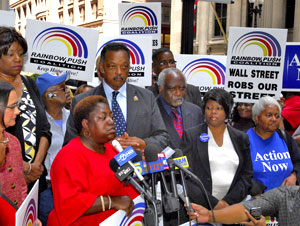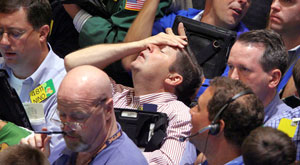CHARLENEM
Taxpayers to pay $700 billion for bailout
Relief for Wall St., still suffering on Main St.

(FinalCall.com) – Irma Hallwood, a retired Los Angeles County health services worker, is about to lose her home to foreclosure and she has already lost some of her Social Security benefits. When President George Bush asked Congress for authorization to use taxpayer money to buy $700 billion of bad debt from banks and other financial institutions, she became outraged.
“We’re losing our jobs. We’re losing our homes, so what does Bush want us to do?” Ms. Hallwood asked. “I am disabled, retired and they cut my Social Security because they said my retirement was too good to get the full benefit. I’ve been in my home for 32 years, worked all those years, raised a family and now they want to take my home,” she told The Final Call.
In Chicago, the Rainbow PUSH Coalition led by Rev. Jesse L. Jackson, Sr. held a press conference on September 19 in front of the Federal Reserve Bank to demand relief for “the least of these” America’s poor.
Blaming “Wall Street’s greed and Washington’s corruption” Rev. Jackson said the word “poor” is missing from the current economic talk and the presidential campaigns as a result of the intense focus on the middle class and the huge corporations.
“The poor must be (included) in the restructuring of the American economic agenda,” said Rev. Jackson. “Lack of regulation, lack of oversight, unenforced fair lending laws and greed led us to a catastrophe,” he added.
Financial analysts predict that, like Ms. Hallwood, millions of taxpayers forced to shoulder the bailout may face individual economic and social disaster for years.
“It’s not right and it’s not fair that Wall Street can operate without any prudent regard for risks and the taxpayers are now consigned to cover their risks. If a kid asks for two dollars to go to college, the Republicans tell us that this is socialism, ‘and Sen. Obama and you lefties sound like a bunch of Marxists,’ but when it comes to corporate America getting welfare, not a peep out of them,” said Andre Egglletion, a radio host with the U.S. Talk Network (www.ustalknetwork.com) and author of “Thieves in the Temple: America Under the Federal Reserve System.”
Mr. Egglletion and other economists say the bailout of Wall St. institutions saddled with huge bad debt from often speculative practices amounts to corporate welfare taxpayers will finance. Meanwhile Americans are already drowning in debt due to higher gas prices, enormous, re-adjusting subprime mortgage payments, and increased costs for medical care and prescription drugs. They face growing food prices along with increased college tuition alongside increased unemployment and massive job layoffs.
All across country, ordinary people are wondering when will the federal government use their own tax dollars to bail them out?
In Los Angeles alone, renters have had to vacate some 7,100 foreclosed apartments. Across the nation, Black business owners have reported its getting harder to get business loans and leverage assets for cash. According to Henry Alford, President and CEO of the National Black Chamber of Commerce, new venture plans will be delayed, and Black business growth will suffer.

“What you have is socialized risks for corporate America and fend for yourself conservatism for the American people,” Mr. Egglletion told The Final Call.
In addition, he said, there are no regulatory safeguards to protect taxpayers from this crisis, which is just the tip of the iceberg. Despite some rallying on Wall Street, the fundamentals are not in place for the economy to rebound, Mr. Egglletion said.
Some analysts advise people have to accept the fact that the U.S. is in dire straits economically, and say more money should go into diverse stock portfolios.
What about the poor who have no portfolio?
Mr. Egglletion said that whether people have money or not, people should learn how Wall Street and wealth works. Teach it to children in schools, he said.
U.S. Treasury Secretary Henry Paulson, Jr. has advocated for swift implementation of a trillion dollar bailout to avoid more failures of financial institutions and frozen credit markets. Congress and the administration were trying to hammer out a deal to make it work at Final Call presstime.
The bailout agreement would permit the federal government to purchase difficult-to-sell assets like troubled mortgages from banks and other institutions. The Treasury Department has established a temporary guarantee program to ensure that investors are compensated if money market funds must liquidate. For every dollar invested in an insured fund, they will be able to take a dollar out.
In addition, the Federal Reserve will purchase short-term obligations issued by Fannie Mae, Freddie Mac, and the Federal Home Loan Banks and effective Oct. 2, the Securities and Exchange Commission would prohibit investors from intentionally driving down particular stocks for their own personal gain.
In a counter-propoposal, Senator Chris Dodd and other Democratic lawmakers sought more review and oversight of the Bush plan, including authority for bankruptcy judges to restructure mortgages for homeowners facing foreclosure. The counter-legislation would also:
– require the Treasury to take the bulk of its profits from new purchases and put it into a governmental affordable housing program;
– limit executive compensation and revoke compensation that Wall Street executives received based on fraudulent claims; and
– appoint an independent inspector general, assigned by the president, to investigate the Treasury asset program.
President Bush has acknowledged that his proposed plan is risky. It would not address falling home values but it would allow banks to resume lending and compensate investors if money market funds are forced to liquidate.
This September surprise bailout is the latest in a string of radical, governmental rescues–which include lending billions to save Bear Stearns, the major Wall Street investment bank; taking over federal mortgage giants Fannie Mae and Freddie Mac and propping up American International Group, the country’s largest insurance firm. Washington Mutual Bank put itself out for auction to help with its losses. Bank of America struck a deal to purchase Merrill Lynch, and Lehman Bros. went bankrupt.
According to Secretary Paulson, the overarching problem is that five million homeowners are delinquent on mortgage payments or are in foreclosure. Already, he said, banks are not able to move the bad assets; companies cannot borrow money; and the frozen market has threatened people’s personal savings, crippled lending and investments, and interrupted job creation.
“This is a humbling experience to see so much fragility in our capital markets and to ask how did we ever get here,” Sec. Paulson said during a Sept. 21 interview on NBC’s news talk show “Meet the Press.”
News anchors and financial analysts say that the U.S. economic crisis is similar to the Great Depression, but others say the country isn’t there yet.
When the stock market crashed on October 24, 1929, it brought on the worse and longest collapse of an economy in the modern, industrial world. The production and sale of goods declined. Unemployment rose. Businesses and banks shut their doors, and people lost their jobs, homes and savings.
Grassroots organizers say people are outraged that they will be paying to fix America’s money problems and save the very institutions that caused the disaster.
Sharon Black, co-coordinator of the National Network to Stop Foreclosures & Evictions, said taxpayers do have other alternatives and none of them involve nursing greedy corporations and executives.
People could divorce the U.S. financial system and start an independent movement by running their own school systems, building their own houses, feeding each other and taking care of the sick, she said.
“It’s perception and how the mainstream media have fed us–that there’s nothing else that we can do but bailout these banks. The notion that whatever’s good for Bank of America is good for the rest of us is just an acceptance of the way that they’ve painted the picture.
“It’s ridiculous! Trillions and trillions of dollars being spent to pay for the greed of companies whose only interest is making profits. That trillions of dollars belongs to us, and the issue is we should not be put out of our homes. We have the right to a job. People have a right to eat. There’s no reason why any of these things can’t be done,” Ms. Black told The Final Call.
Dr. Claud Anderson, author of “PowerNomics: The National Plan to Empower Black America,” said the current economic problem is tied to historic racism that heightened through the 1960s and civil rights era. Dr. Anderson argues Whites ignored the 1964 and 1965 civil rights laws that prohibited discriminating against Blacks in employment. To avoid employing Blacks, Whites abandoned cities and moved to the suburbs. “As they moved, they displaced all of the wealth, companies and banks … by 1965, Congress gave them incentives to move their factories out of the U.S. into cheap labor markets, which started the process of globalization,” he said.
“They gave equality to people in Third World countries rather than give it to Black folks. They began to manufacture products, services and goods and compete with the United States for energy, gas and everything else. By 1972 they were competing for oil and gasoline – the U.S. used to be the producing nation, but now it’s the debtor nation, and now we have a trillion trade deficit,” he said.
“I’m 60-years-old and I’ve never witnessed the economy in such shambles. We are in trouble and we have no clue how to get out of it, there needs to be a Million Man March every month,” Mr. Alford said. “The economic indicators in the Black community after the Million Man March were so positive. Businesses just grew. They started getting on the right track and now that the main foundation of the country is shaking, thousands of untold citizens are going to suffer if we don’t start coordinating and committing to struggle,” he said.
The economy is heading toward the rapid centralization of the financial regulatory agencies, without any accountability to the people, Mr. Egglletion said. “It’s what the Federal Reserve has wanted for a long time, complete and total control of the financial system in the United States. They have it now,” he said.
Related links:
America’s economic downturn (FCN, 04-11-2008)
Are U.S. Treasuries Headed For Junk Bond Status? (FCN, 02-04-2008)
An Issue No Presidential Candidate Will Touch? (FCN, 01-28-2008)












